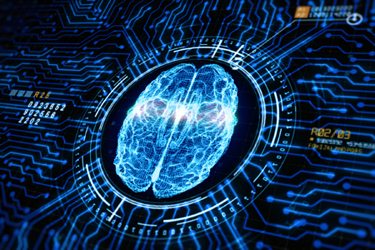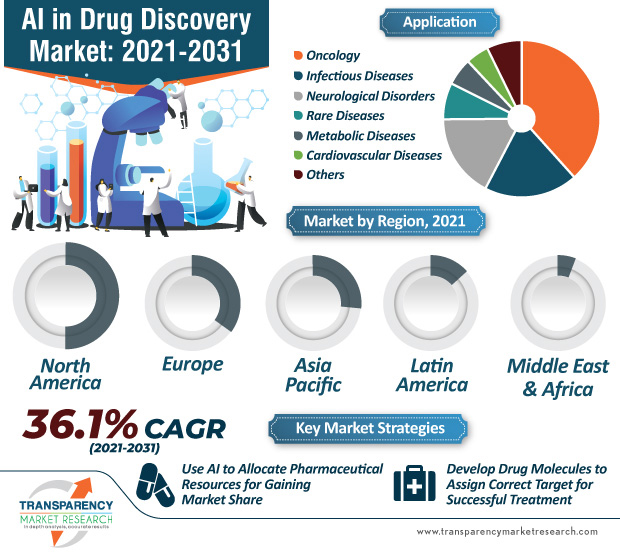Using AI In Drug Discovery: The Latest Market Research
By Nitin Chitmalwar, Transparency Market Research

Artificial intelligence (AI) is at the forefront of next-gen healthcare technologies and has penetrated the life sciences and the pharmaceutical sector extensively. The pressing need to reduce drug prices for some deadly diseases such as cancer that require long-term treatment is accelerating technology-driven drug discovery. The deployment of AI-driven drug discovery in areas such as oncology, neurology, and cardiology reduces gaps in R&D for improved drug manufacturing processes and further helps in targeted manufacturing of drugs. This is attracting pharmaceutical and biotechnology companies, contract research organizations, and academics and research institutions to adopt these technologies.
According to the analysts at Transparency Market Research, the AI in drug discovery market is projected to clock a CAGR of 36.1% during the forecast period of 2021-2031. The expanding use of AI to allocate pharmaceutical resources will have a profound impact on the growth of the AI in drug discovery market.

The demand for drugs to reduce the intensity of the damage caused by coronavirus infection is increasing at a rapid rate. AI is proving to be essential for speeding up the research for COVID-19 drugs. This will have a massive impact on the growth structure of the AI in drug discovery market.
Advantages Of AI In Drug Discovery
AI drug discovery platforms have a plethora of advantages. Some of the major advantages are:
- Enhanced speed and efficiency
- Improved compliance
- Good quality control
- Extensive patient care
- Decreased contamination risk
- Less human intervention
- An array of technological developments in the pipeline that will help improve the quality of life of individuals around the globe
Although AI drug discovery platforms have extensive advantages, they also have some disadvantages. Some of them are:
- High cost
- Lack of professionals skilled in operation of platforms
- Low awareness in developing countries
Top 3 Uses Of AI In Drug Discovery
Research on Prescription Drugs: The development of prescription drugs is expected to fuel the growth of the AI in drug discovery market to a great extent. Furthermore, these platforms also check the effectiveness of existing drugs.
Enhanced Patient Care: As these platforms can track the efficacy of the existing drugs, researchers and collaborators can explore how a specific drug can be made more useful and beneficial for patients.
Prevention of Errors: Using AI drug discovery platforms in error prevention can stimulate the overall growth of the global market. Many drugs have side effects, which can be harmful to patients and can reduce the revenues of pharmaceutical companies. With the help of AI drug discovery platforms, errors and the reasons behind side effects can be researched and corrected.
Many well-entrenched players in the pharmaceutical sector are collaborating with healthcare technology companies on AI platforms with the aim of enhancing target detection and validation. AI models assist in accentuating clinical trials and getting closer to the root cause of diseases. Some well-entrenched players in the AI in drug discovery market are IBM, Exscientia, Numedii, Verge Genomics, Cloud Pharmaceuticals, OWKIN, Inc., Berg LLC, NVIDIA, Deep Genomics, Recursion Pharmaceuticals, BlackThorn Therapeutics, PathAI, Inc., Atomwise, BioSymetrics, Insitro, Benevolent AI, and GNS Healthcare. These collaborations will eventually help increase the growth rate of the AI in drug discovery market.
Start-up Culture Introduces Novel Technologies And Adds Value To Growth Trajectory
Many start-ups are coming up with new ideas and techniques for competing against well-established players in the AI in drug discovery market. The new players are improving AI drug discovery platforms with added features and technologies that attract extensive attention from consumers. Strategic collaborations are helping numerous start-ups to expand their influence across various regions.
For instance, CytoReason, an AI drug discovery platform, recently partnered with Summit Pharmaceuticals International to tap into the Japanese market. In another development, Quris, an AI drug discovery platform, raised $9 million to research and reduce the risks and costs of failed clinical trials.
Funding from the governments of numerous countries and educational institutes in AI drug discovery start-ups will also spur the growth of the AI in drug discovery market. Government bodies in various regions are encouraging their citizens to innovate and accelerate the process of drug discovery through adding beneficial features and integrating latest the technologies with their platforms. The Indian Institute of Management, Ahmedabad (IIM-A), recently provided funding to a Bengaluru-based start-up, Mestastop, which is researching solutions that would help address the cancer metastasis threat.
Mergers, acquisitions, joint ventures, and partnerships are crucial for the growth of the AI in drug discovery market. The players invest in these activities to cement their foothold across the AI in drug discovery market. For instance, XtalPi, Inc., an AI-powered drug R&D company, recently collaborated with Signet Therapeutics to include a novel first-in-class program against a novel cancer target.
Conclusion
The discovery of new viruses has alerted the entire medical fraternity, which is pinning its hope on applying new technologies to develop effective therapies. An efficient vaccine or drug can save many lives and bring a ray of hope to people suffering from various diseases and disorders due to the unavailability of a vaccine. Deploying AI in the drug discovery process will be a critical part of accomplishing that goal.
